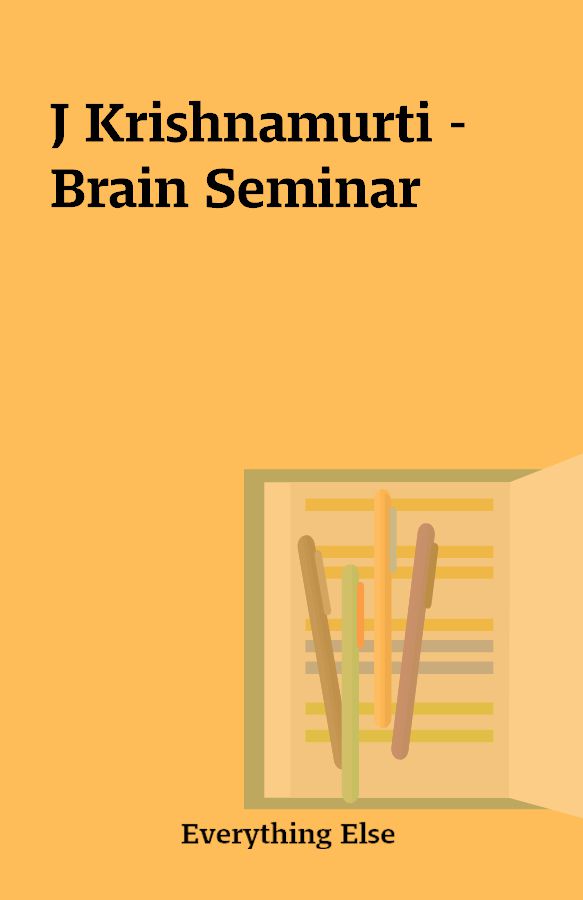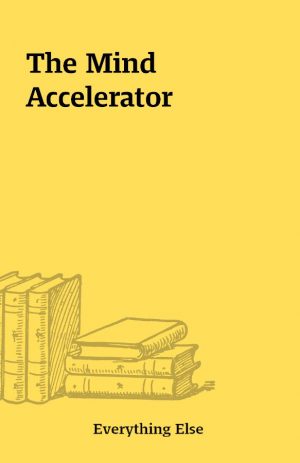J Krishnamurti – Brain Seminar
J Krishnamurti – Brain Seminar
[ 1 VHSRIP – 3 AVI ]
Description
An Overview of Krishnamurti’s Life and WorkJiddu Krishnamurti was born on 11 May 1895 in Madanapalle, a small town in south India. He and his brother were adopted in their youth by Dr Annie Besant, then president of the Theosophical Society. Dr Besant and others proclaimed that Krishnamurti was to be a world teacher whose coming the Theosophists had predicted. To prepare the world for this coming, a world-wide organization called the Order of the Star in the East was formed and the young Krishnamurti was made its head.In 1929, however, Krishnamurti renounced the role that he was expected to play, dissolved the Order with its huge following, and returned all the money and property that had been donated for this work.From then, for nearly sixty years until his death on 17 February 1986, he travelled throughout the world talking to large audiences and to individuals about the need for a radical change in mankind.Krishnamurti is regarded globally as one of the greatest thinkers and religious teachers of all time. He did not expound any philosophy or religion, but rather talked of the things that concern all of us in our everyday lives, of the problems of living in modern society with its violence and corruption, of the individual’s search for security and happiness, and the need for mankind to free itself from inner burdens of fear, anger, hurt, and sorrow. He explained with great precision the subtle workings of the human mind, and pointed to the need for bringing to our daily life a deeply meditative and spiritual quality.Krishnamurti belonged to no religious organization, sect or country, nor did he subscribe to any school of political or ideological thought. On the contrary, he maintained that these are the very factors that divide human beings and bring about conflict and war. He reminded his listeners again and again that we are all human beings first and not Hindus, Muslims or Christians, that we are like the rest of humanity and are not different from one another. He asked that we tread lightly on this earth without destroying ourselves or the environment. He communicated to his listeners a deep sense of respect for nature. His teachings transcend man-made belief systems, nationalistic sentiment and sectarianism. At the same time, they give new meaning and direction to mankind’s search for truth. His teaching, besides being relevant to the modern age, is timeless and universal.Krishnamurti spoke not as a guru but as a friend, and his talks and discussions are based not on tradition-based knowledge but on his own insights into the human mind and his vision of the sacred, so he always communicates a sense of freshness and directness although the essence of his message remained unchanged over the years. When he addressed large audiences, people felt that Krishnamurti was talking to each of them personally, addressing his or her particular problem. In his private interviews, he was a compassionate teacher, listening attentively to the man or woman who came to him in sorrow, and encouraging them to heal themselves through their own understanding. Religious scholars found that his words threw new light on traditional concepts. Krishnamurti took on the challenge of modern scientists and psychologists and went with them step by step, discussed their theories and sometimes enabled them to discern the limitations of those theories. Krishnamurti left a large body of literature in the form of public talks, writings, discussions with teachers and students, with scientists and religious figures, conversations with individuals, television and radio interviews, and letters. Many of these have been published as books, and audio and video recordings.J. Krishnamurti’s Brain Seminar at Brockwood Park – the first of three, in which the he talks with a number of international scientific luminaries on the subject of whether thought can help us to understand the brain and the complexities of life. J. Krishnamurti’s co-speakers are Dr Shainberg, a psychiatrist from the United States, Dr Peat, a physicist, writer and film-maker from Canada, Professor Professor Bergstrom, a neuro-physiologist at the University of Helsinki, Finland and Professor Varela, a neuro-biologist at the Max Planck Institute for brain research in Frankfurt. J. Krishnamurit opens the talk by asking whether one can understand one’s own brain And its activities and complexities without operating on animals and dead bodies and so on. He suggests that it is indeed possible if one can watch very carefully, objectively, without any bias, the reactions, the biological responses and the inward urges and temperaments and idiosyncrasies, the whole complexity of human existence. Moreover, to achieve this, to approach this very complex problem you ironically have to do it in a very simple manner: `by simplicity, without compulsion, without will , without direction and without a motiveIn this second of the three-part series, the eminent panel move on from the question whether thought can help us understand the brain to discuss with J. Krishnamurti whether it is possible for the brain not to have psychological recording. From the outset, J. Krishnamurti points out that theories and speculations, whether psychological or spiritual, have no meaning to him. The only significant thing to him is dealing with facts; facts being that which has happened, that which is happening and not what will happen. The first question, then, is `So is the brain a fact now?’. `Of course’, replies J. Krishnamurti, `because it is functioning. Functioning in the sense That it wants to communicate something verbally and also perhaps non-verbally.’ The debate goes on to provide challenging insights and explorations from J. Krishnamurti as well as from this illustrious panel of expertsThe third and final Brain Seminar at Brockwood Park delves into the question whether there is an intelligence that is not born of thought and if so, how would one enquire into it. At the outset J. Krishnamurti asks whether one would enquire into it by saying that which it is not… Immediately the response is the question “You mean by what is false?’ and he answers in the affirmative. Referring to earlier debates in which it was agreed that hate is not love, he goes on to say that all the activities of human beings are contained in the skull. But then he asks, “is love within it, or outside it?’. It is suggested that we could start this process by asking what is an action that is not intelligent, with the example of a machine. A machine carries out repetitive actions without thought because it is preset. J. Krishnamurti then chimes in to point out that WE, after all are programmed too!
You must be logged in to post a review.






Reviews
There are no reviews yet.